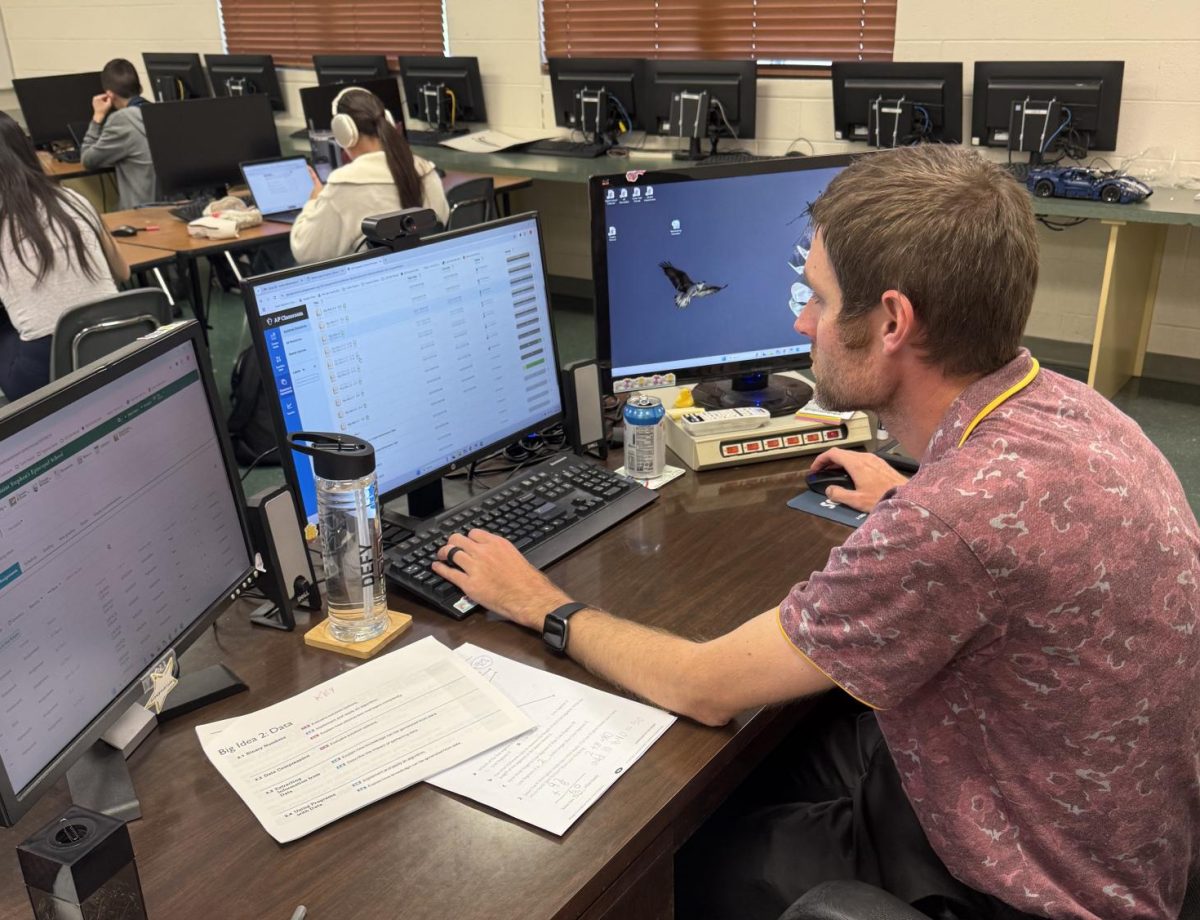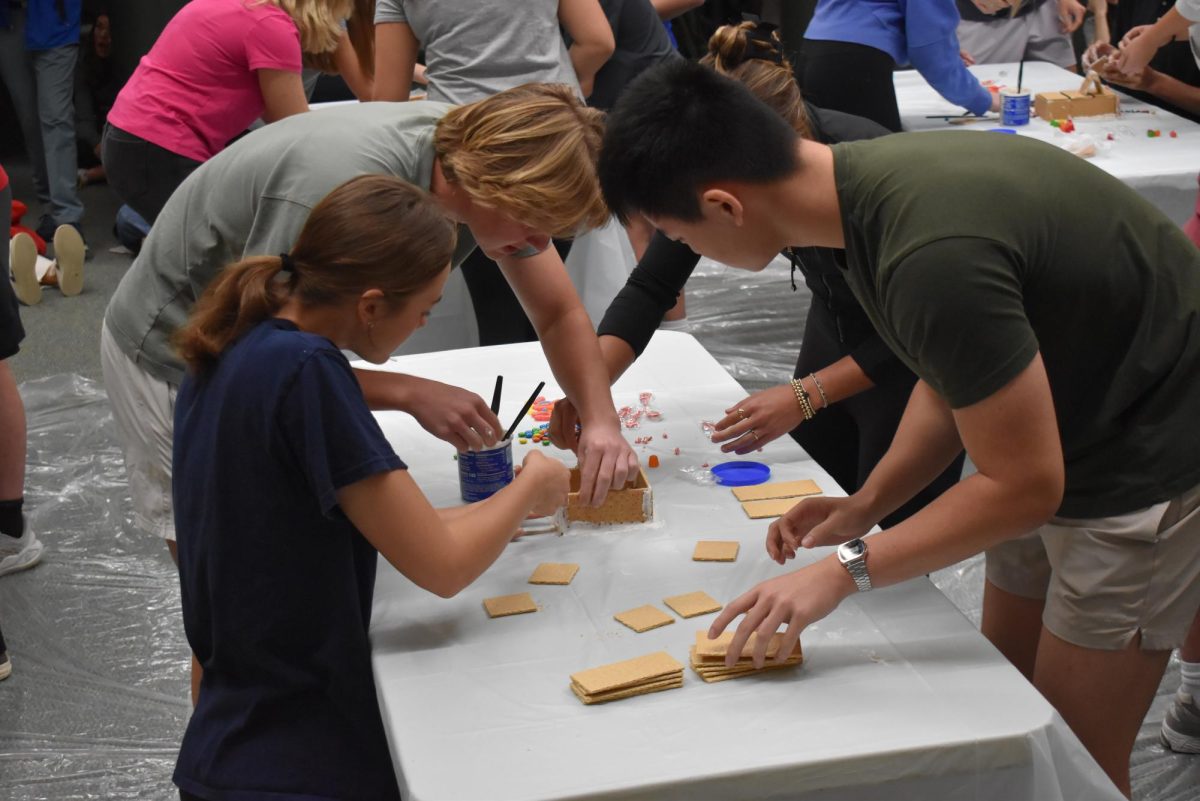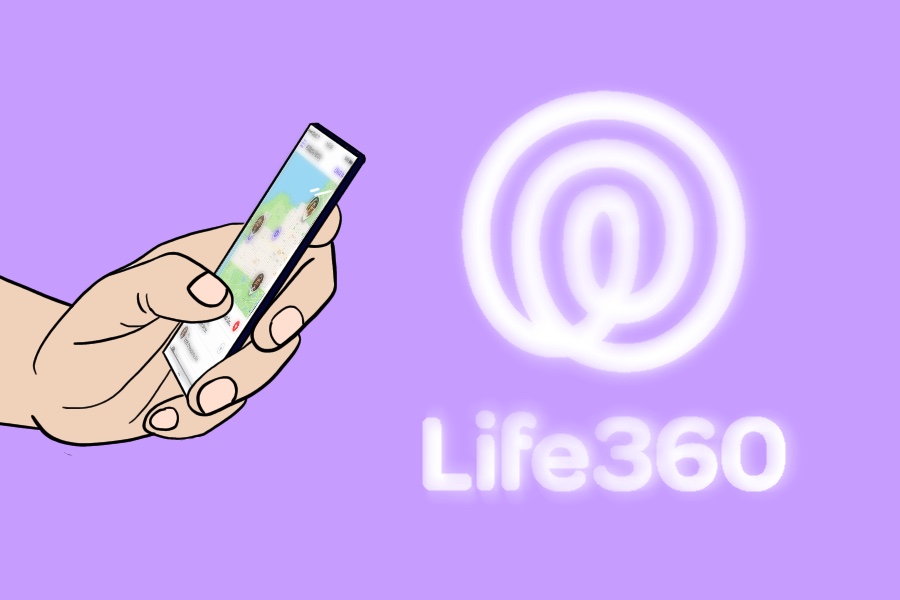They’re watching you… Life under Life360
How beneficial is the controversial family-tracking app Life360? And is it really necessary for high schoolers?
Original art by Gauntlet Staff artist Evanthia Stirou showcasing the app, Life360.
You’re walking out of your house to go hang with friends on a Saturday afternoon, but you get an eerie feeling that someone’s behind you, hovering somewhere nearby, tracking your every move.
Whoever it is, they can see the slightest move, notice any time you speed up or slow down, even keep a time-log of how long you’re at a given place.
You have a constant feeling that someone is following every single thing you do like you have your own personal stalker.
You’re not paranoid, though— you just have Life360, the ethically questionable app that helps parents keep tabs on you at all times.
Currently, there are 27.2 million users on the popular app, Life360. If you haven’t heard the numerous complaints from teens (or praises from parents) about the app yet, here’s a little background information: Life360 is an tracking app that can, yes, track your every move. It keeps a record of your locations and how long you’ve been there for all the members in your “group” (probably your family) to see. Also, it can track your battery percentage on your phone, and even see everything you do as you’re driving in real-time.
![]() Loading ...
Loading ...
If your parents were to go on the app and look at your location, they’re able to tell the exact time you arrived and left a location; the app even actively shows every slight movement you make, even you just go a house or two down. Even better, if one clicks on your icon on the app’s map while your moving, one can see the exact speed you’re going as you drive.
Sounds fun, right? The company’s slogan is, “Feel free, together.” But nothing about this app seems to embody the definition of feeling “free.” The reason most parents have for using this new toy is that they’re truly just worried about the safety of their children.
But when that protection turns into constant patrolling every time their child goes out, it can become unhealthy.
The app’s standard display is a map with pictures of each member showing his or her exact location at that time. If you click on the member’s picture you can get exact statistics as to how long he/she has been in a location and for how long and the exact details of any drive that person has made. This information can all be saved for up to a month on the app.
Building a strong foundation of trust between a teen and their parents is an essential part of surviving your teenage years, but it’s difficult to do that when this app is a such an active participant in everyone’s lives. Installing this Life360 instead of a less extreme like Apple’s “Find My Friends” is basically telling the child that they’re trusted so little they need an overly-controlling application to track every move they make.
Mr. Johnson, an English teacher in the Upper School said, “As a parent, I don’t have the app for my kids; it all just feels overwhelming. If I can’t trust my kid to be where they are when they say they’re going to be there, then we’ve got other work to do that an app certainly won’t solve. Kids know how to find their way around it so that it becomes a game and something else to fight about, and there’s enough to fight about as it already is.”
Trust is a concept that goes both ways in any relationship. It’s important to take some time and build that trust in a relationship with your parents, whether it’s proving over time you can be out on your own, proving you’ll be honest in all situations, or even reinforcing trust by sitting down and talking about what everyone’s expectations for each other ought to be.
With Life360 installed, it often leads to kids trying to figure out ways to get around it, but lucky for parents the app even shows if you turn your phone off, which is kind of a dead giveaway that something shady is going down.
This can, in practice, lead to kids leaving their phones places where they aren’t so they don’t have to worry about the constant nagging. But that puts them in more danger should something arise.
Sophomore Summer Grady said she thinks “the app is replacing a need for a trust bond between parents their kids which is not good. While it may be necessary for some kids, I think it’s viewed more like a punishment to hold over anyone’s head who has it, regardless of how good of a kid you are.”
Sure, there’s a simple solution to all of this: teens could avoid going anywhere their parents might say no to, but with this installed feeling of mistrust, it’s not shocking that most teens try to rebel out of spite.
In a more positive light, there can be benefits to the app. If a member in your Life360 group is at a location you need to get to, there’s direct navigation to get to that place. Also, the app can be helpful for parents in case their child gets into a car crash or finds him or herself in a dangerous situation. The app isn’t a terrible concept, but unfortunately, it’s very easy for parents to slip into the unhealthy habits of stalking their kids’ every move just because its available to them.
Junior Sophie Preston, who has had some experience with the app said, “The features that are presented on the app are a bit of an extreme and [they] don’t create a healthy environment for teens and their parents.”
When an app this technologically advanced is presented to the public, specifically worrisome parents, it’s very easy to lead to dangerous habits. Whether or not they see it as their kids do, it seems a lot of parents begin to use the app more as a third parental figure to control their children’s every move instead of using it for the original safety purposes.
Having Life360 isn’t a quality that makes you a good parent; raising your kids with the right morals does. Instead of automatically installing the app on your kids’ phones, maybe start with trying to set expectations and rules that they’d be expected to follow when out on their own to see if they’re trustworthy enough to be somewhere when they say they’re going to be there.
If you can do that successfully, then that builds a trust bond and your kid knows not to put themself in a compromising position. This is a concept that many may forget if they’re getting lost in the glory of the app that does the parenting for them.
Life 360 is a hit-and-miss idea. A strong trust foundation between kids and their parents is essential to survive their high school years and while the basic concept of this app may seem like a good safety precaution, that’s unfortunately not the message being installed into kids’ minds.

Ansley Morris is an Associate Editor in her third year on the Gauntlet staff. She’s a senior who enjoys going to the gym, cooking, and going out on the...

Evanthia is a third-year Creative Director on The Gauntlet. She is a senior here at Saint Stephen's and likes drawing, playing Genshin Impact, and hanging...


















































Mario Popescu • Nov 25, 2021 at 7:24 am
The app also detects if you’ve been in a car crash, you know, one in which you could die, and it alerts your family but of course you don’t talk about that. Stop spreading misinformation. I, for one, as a child, feel very safe knowing that if I get lost, I know where my parents are and they know where I am or if I feel uncomfortable somewhere, they know where I am and I can keep tabs on them to see when they will pick me up
ella • May 23, 2021 at 8:32 pm
how do i send this to my parents without sending this to my parents..
Keith • Mar 25, 2021 at 8:45 pm
How i locate my othwr phone with life 360 also